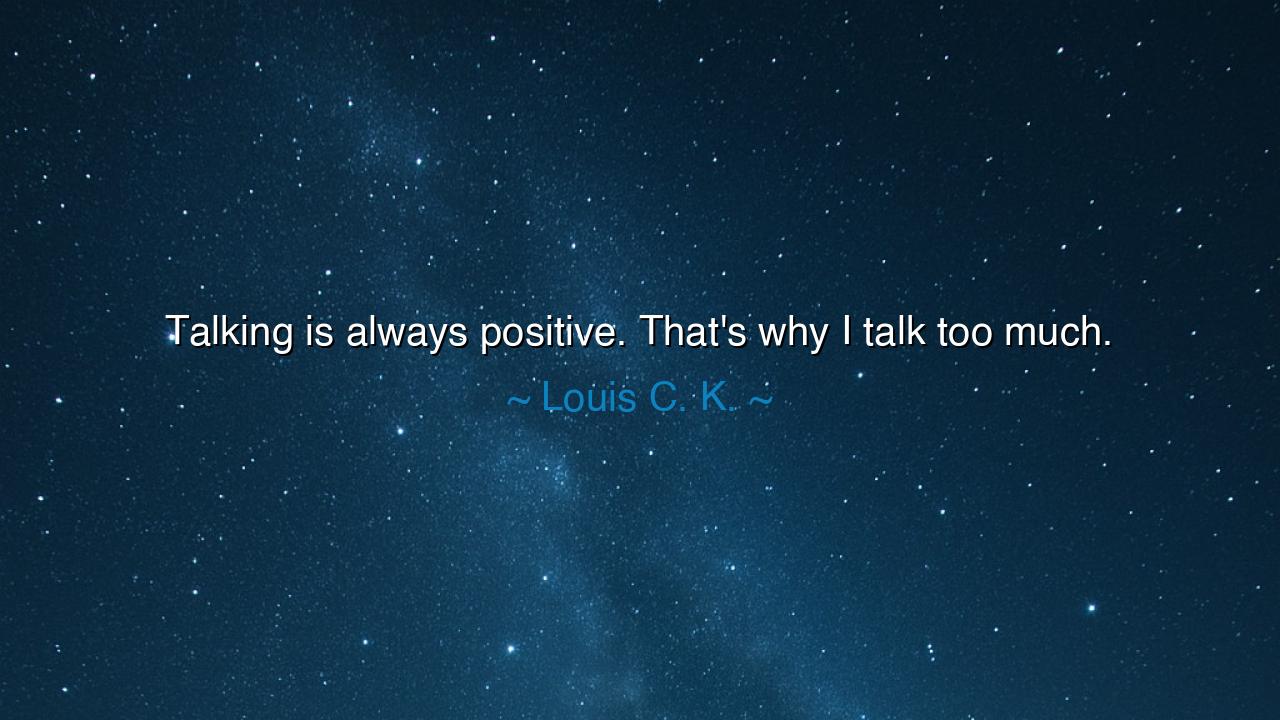
Talking is always positive. That's why I talk too much.






Hear, O seekers of truth and fellowship, the words of Louis C. K., who, with wit wrapped in jest, uttered this profound thought: “Talking is always positive. That’s why I talk too much.” Though spoken in humor, there lies beneath these words a hidden treasure, for in the act of talking there dwells the seed of connection, healing, and understanding. It is through speech that the soul empties its burdens, shares its joy, and weaves bonds with others. The tongue, though small, is a mighty bridge between hearts.
In the ancient days, long before the written word, tribes gathered around the fire, and their strength was not in silence but in talking. They spoke of the hunt, of the stars, of the spirits, of their ancestors. Through such speech, they found unity, wisdom, and courage. Silence may have its sacred place, but too much silence isolates the soul, while talking brings warmth, as fire brings light to the cold night. Thus, Louis, in his jest, touched a truth as old as humankind: speech is life shared.
Consider the story of Abraham Lincoln, who in the darkest hours of America’s Civil War carried within him the weight of division. He could have retreated into silence, but instead he turned to words. His speeches—simple, humble, yet deeply moving—bound the wounds of a fractured people. The Gettysburg Address, brief as it was, gave meaning to sacrifice and hope to the weary. In this we see the power of talking: words that are positive not because they flatter, but because they give courage, clarity, and purpose.
Yet the saying warns us of another truth—that in the abundance of speech lies both blessing and danger. To “talk too much” can be a weakness if the words are empty or harsh. But if the words flow with sincerity, humor, or compassion, even abundant speech may become a balm to others. The danger is not in speaking much, but in speaking without thought. For the ancients said: “Words are arrows; once loosed, they cannot be recalled.” Thus, let your arrows be tipped with kindness and aimed with care, lest they wound rather than heal.
Still, the wisdom of Louis reminds us that silence, when driven by fear or pride, is often a prison. How many quarrels fester because no one speaks? How many friendships wither because silence is allowed to grow? Talking—even too much—can mend, reveal, and reconcile. Better to stumble over words of honesty than to withhold them and let misunderstanding harden the heart.
Therefore, O children of tomorrow, let your voices not be buried. Talk to your friends, your family, your companions. Speak your gratitude, your doubts, your hopes. Do not let days pass in silence when a single word could lift a soul. But also, let wisdom guide your tongue. Speak not only to fill the air, but to give breath to life, laughter, and love. In this balance lies the art of communication—the eternal dance of the heart through words.
The lesson is thus: Talking is always positive when it is rooted in truth, compassion, and courage. Do not hoard your words in the vault of silence, for they are meant to be shared. Let your speech be the lamp that chases away the darkness in another’s mind, the hand extended across distance, the spark that ignites connection. Speak much if you must—but let your words carry life, as rain carries nourishment to the soil.
So remember the humor and hidden wisdom of Louis C. K.: “That’s why I talk too much.” Learn from it not to fear words, but to honor them, to wield them well, and to let them flow as instruments of healing and light. For in the end, we are all but voices in the great chorus of existence, and it is through talking that we join our song to the eternal melody of mankind.
––






NKNguyen Khanh
I’m intrigued by the humorous self-awareness here. Could the idea that talking is always positive be more about personal catharsis than actual benefit to others? How do we measure whether expressing ourselves incessantly creates value, strengthens connections, or merely fills space? I’d like to hear perspectives on when talking becomes empowering versus when it risks overshadowing listening and empathy.
NMNguyen Thi Ngoc Mai
This makes me reflect on self-awareness and social dynamics. How does one know if talking too much is helpful rather than irritating? Could frequent talking be a strategy to connect, but also a way of avoiding silence or reflection? I’d like to explore ways to harness the positive aspects of communication while minimizing potential negative effects on relationships or group dynamics.
TMthành min
I find this perspective intriguing because it frames talking as inherently constructive. But does constant talking always contribute to understanding or problem-solving, or can it sometimes obscure deeper issues? I’m curious how this approach works in collaborative environments where listening might be equally or more important than speaking, and whether people who talk a lot are aware of the impact on others.
VTDinh Van Tam
This quote made me laugh, but it also makes me think about the role of communication in personal and professional life. Is talking truly always positive, or can it sometimes overwhelm or alienate others? I’d like to explore how people can balance the benefits of expression with the need to listen, and whether there’s a point where talking too much becomes counterproductive.